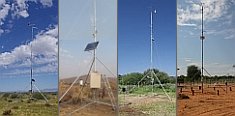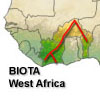Project description |
In some agricultural areas snakes are known to be the major top-down regulators for various rodent populations, and thereby also control important rodent pest species and vectors of fatal diseases (e.g. Lassa fever). However, snakes are most often immediately killed when encountered. This negative effect on important top-predators is increased by the fact that some snake species are killed as a food source (pythons, large vipers and cobras), for traditional medical use, and collected for the international pet and leather markets.
Our aim is to assess the current status (distribution, natural abundances, national market situation) of one snake species, which is extensively traded in Benin: the Royal Python (Python regius). We investigate the current amount of collecting of Royal Pythons by local peasants and the numbers exported by local dealers to estimate the actual snake numbers taken from the field, and compare them e.g. against the official CITES data. Together with co-operations outside BIOTA, our in-country data will contribute to a better understanding of the interweavements of the current trade of Royal Pythons in and outside Benin (DBE Würzburg University, WWF/TRAFFIC) and may help to reduce numbers of harvested pythons by providing NGOs and governmental agencies with specific prescriptions for preventing continued unsustainable removals from the wild. We will further assist the “Institute National des Recherches Agricoles du Bénin” to evaluate captive breeding programmes, and to set up a certification of snakes bred in captivity.
|






 Go to the WeatherNet
Go to the WeatherNet BIOTA West Africa - Workpackage - CT2-T2-WP6
BIOTA West Africa - Workpackage - CT2-T2-WP6 Over-harvesting of snakes and its ecological and economical consequences
Over-harvesting of snakes and its ecological and economical consequences